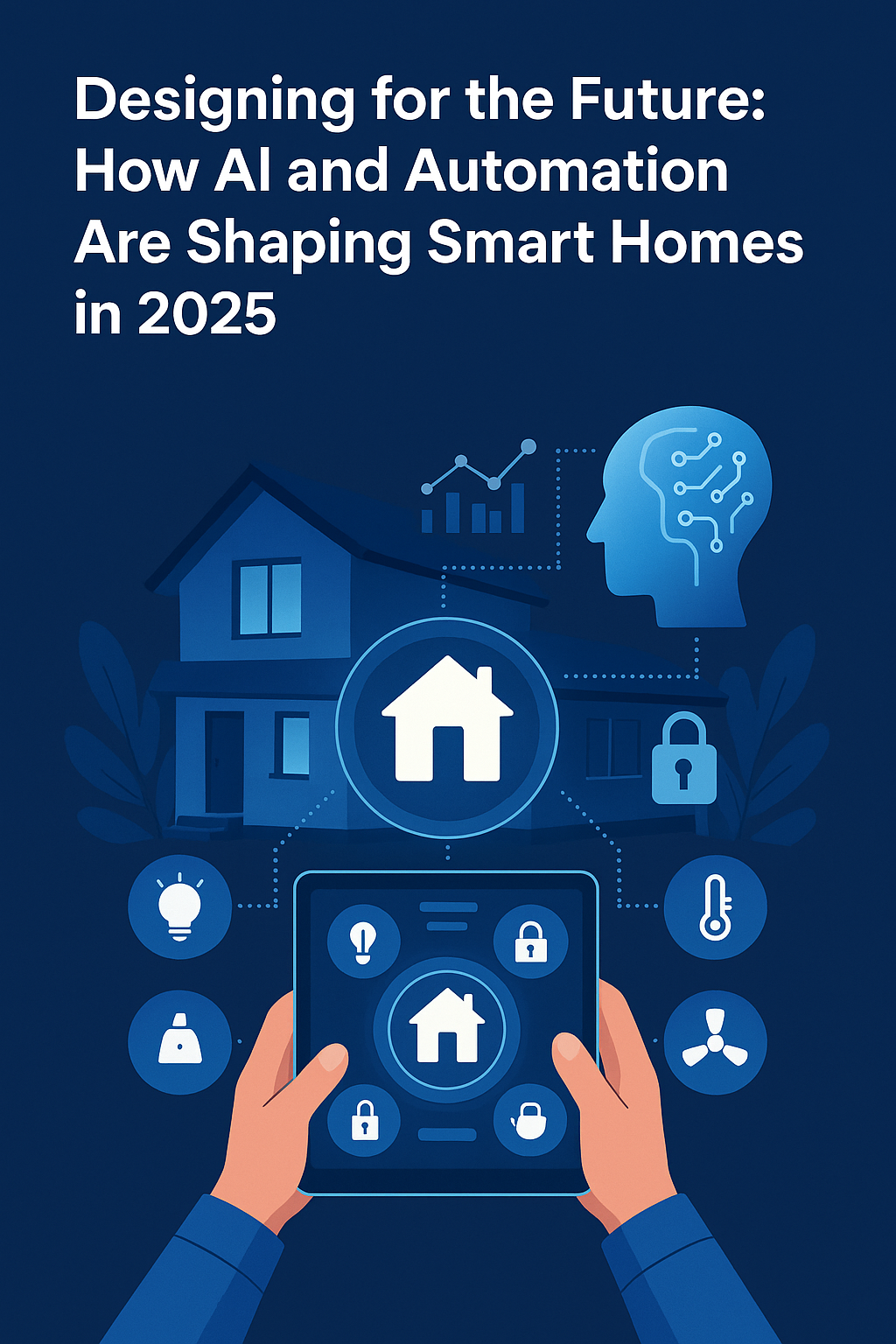Introduction
The concept of a "smart home" has evolved far beyond voice-controlled assistants and automated lighting. As we step into 2025, artificial intelligence (AI) and advanced automation are revolutionizing how we live, interact with, and design our living spaces. Smart homes are becoming intelligent ecosystems that anticipate our needs, improve energy efficiency, enhance security, and redefine comfort.
In this blog, we’ll explore the transformative impact of AI and automation in shaping smart homes in 2025 and what it means for homeowners, real estate developers, and investors.
1. AI-Powered Personalization: Homes That Think Like You
In 2025, smart homes are no longer just responsive—they are proactive. AI algorithms analyze occupants’ behavior, preferences, and routines to create deeply personalized living experiences.
-
Lighting & Climate Control: AI learns when you prefer natural lighting, what temperature makes you most comfortable, and adjusts it automatically.
-
Appliance Usage: From brewing your coffee the moment you wake up to preheating the oven before dinner, automation ensures convenience is just a thought away.
-
Home Layout Adaptation: Modular smart furniture and adaptive layouts optimize room usage based on daily activity predictions, especially in urban compact homes.
This level of personalization not only improves comfort but also contributes to wellness by reducing daily stressors.
2. Energy Efficiency and Sustainability with AI
Sustainability has become a top priority in modern real estate, and smart homes are leading the way.
-
Predictive Energy Management: AI systems track energy usage patterns and weather forecasts to optimize heating, cooling, and lighting.
-
Smart Grids & Solar Integration: Homes equipped with solar panels now use AI to sell excess energy back to the grid, manage battery storage, and reduce dependency on traditional energy sources.
-
Eco-Friendly Appliance Automation: Smart devices operate during off-peak hours or when solar generation is high, further improving energy conservation.
This automation not only helps save the planet but also cuts down on monthly energy bills—an attractive proposition for homebuyers and investors alike.
3. Enhanced Security with Intelligent Monitoring
Security is a major driver of smart home adoption, and AI is taking it to new heights in 2025.
-
Facial Recognition & Behavior Analysis: AI-enhanced cameras can differentiate between family members, visitors, and unknown individuals—even detect suspicious behavior patterns before an incident occurs.
-
Real-Time Alerts & Remote Monitoring: Homeowners receive instant alerts via smartphone apps, with live feeds and AI-powered anomaly detection.
-
Predictive Maintenance: Smart sensors detect water leaks, gas leaks, or appliance malfunctions and notify you before they escalate.
As automation secures homes from both external and internal risks, peace of mind is becoming a standard feature in modern living.
4. Voice Assistants 2.0: From Commands to Conversations
Voice assistants have matured from responding to simple commands to holding natural conversations, making them more integral to the smart home ecosystem.
-
Contextual Understanding: In 2025, smart assistants understand not just what you say, but why you're saying it. They provide suggestions based on tone, urgency, and past behavior.
-
Multi-Device Coordination: From opening your smart blinds to adjusting the air purifier and queuing up a playlist—all at once—AI coordinates multiple devices in sync.
-
Health & Wellness Tracking: Assistants now monitor sleep patterns, suggest diet plans, and even sync with your fitness data to create optimal living conditions.
These AI tools have become virtual family members, proactively contributing to your lifestyle.
5. Home Automation and IoT Integration
With the Internet of Things (IoT), homes are more connected than ever.
-
Centralized Control Hubs: A single dashboard or mobile app controls everything—security, entertainment, lighting, HVAC, and even smart gardening systems.
-
Interoperability Standards: In 2025, most smart devices adhere to unified protocols (like Matter), allowing seamless interaction between different brands and ecosystems.
-
Learning Ecosystems: Devices communicate with each other to optimize performance. For example, your AC adjusts based on room occupancy data from motion sensors.
This level of interconnectivity turns homes into intelligent ecosystems that manage themselves efficiently.
6. AI in Real Estate Design and Development
AI and automation aren't just enhancing homes—they’re influencing how they're designed and built.
-
Predictive Design: AI analyzes demographic trends and climate data to help developers design future-ready smart homes.
-
Construction Automation: Robotics and 3D printing have accelerated homebuilding while reducing labor costs and environmental impact.
-
Virtual Property Tours & Smart Contracts: AI-generated virtual walkthroughs and blockchain-based smart contracts are now common, making property transactions more transparent and efficient.
Homebuyers in 2025 are not just looking for homes—they’re looking for smart investments in AI-enhanced living.
7. Smart Homes for All: The Democratization of Technology
One of the most significant trends of 2025 is the widespread accessibility of smart home technology.
-
Affordable Automation: Entry-level smart home kits and cloud-based AI services have made intelligent homes accessible to middle-class buyers.
-
Rental-Friendly Smart Devices: Removable, non-invasive devices cater to tenants who want automation without violating lease terms.
-
Government Incentives: Many countries now offer tax benefits or subsidies for homes that meet energy-efficient and tech-readiness standards.
This democratization ensures that smart homes are not just for the elite but available to a growing majority.
Conclusion
As we move deeper into 2025, AI and automation are no longer futuristic concepts—they are the new standard in home design and lifestyle. Smart homes powered by AI are redefining what it means to live comfortably, securely, and sustainably.
For real estate developers, embracing these trends is essential to stay competitive. For homebuyers, investing in a smart home is an investment in convenience, savings, and future value.
Welcome to the age of intelligent living—where your home truly works for you.
